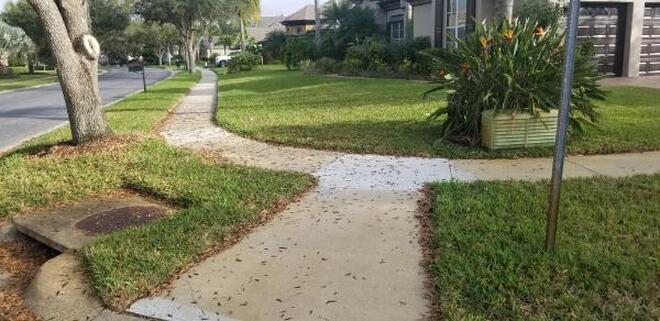|
One of the great things about having a home in the Tampa Bay area is the amount of living we can do outdoors. Many homeowners have extensive outdoor living spaces where they can relax, entertain and cook meals. These hardscapes amidst the lush landscaping of palms and tropical plants can beautify your property. Concrete pavers are often used to create patios, walkways and driveways in a residential landscape. They are popular because of their durability and the fact that they often last longer than regular concrete surfaces. However, no matter how well you maintain pavers, at some point, they will become dirty through regular usage. To keep your pavers looking good, you should regularly sweep dirt on your pavers away with a broom. Spraying pavers with a garden hose, followed by sweeping will do an even better job.
At some point, however, your pavers can begin to look dull and dingy and you'll need to do more to make them bright again. This situation is particularly true when oil or grease has caused stains on the surface of the pavers. Driveways are prone to staining because of leaks coming from vehicles. Outdoor dining and food preparation areas can also suffer when grease from grills or plates is dropped on the surface. Here is what you can do to remove oil and grease stains from your pavers.
Accidents happen. You can't always be there when spills occur, but when you are, try to remove the liquid immediately. Place absorbent rags on top of the stain and blot the area. Try not to rub as this action can cause the stain to spread.
If a significant amount of grease or oil remains on your pavers, pour kitty litter over the area, covering it completely, and let it stand for 24 hours. Gently push the litter into the stain, but don't use a wire brush for this purpose as it can scratch your pavers. The kitty litter should soak up a significant amount of the remaining liquid. Sweep away the litter after a day and dispose of it.
Cover the stain with detergent. Many dishwashing liquids are good for this purpose and will produce a better result. If possible, try to use a natural product. Placing a mixture of baking soda and vinegar on top of the stain is another option. After letting the detergent mixture sit on top of the stain for 30 minutes, take a bristle brush, dip it into a bucket of water and scrub the area. Repeat until the stain disappears. Again, avoid using wire brushes as they can scratch your pavers. If the stain is still evident, try scrubbing the area with a mixture of 1/2 cup of trisodium phosphate mixed into one gallon of water. Make sure to use eye protection and wear rubber gloves if performing this step. Another possibility is liberally spraying oven cleaner on the stain and letting it sit on the stain for 20 minutes. Remember, however, that oven cleaner contains chemicals that are not kind to the environment and can possibly harm sections of your landscaping that it comes into contact with through runoff. Commercial degreasers are also an option for stubborn stains. Many paver manufacturers also have recommendations on what substances to use to clean paver surfaces. Always check those recommendations when trying to remove stains.
Use a garden hose with a nozzle to rinse the area. Select a higher-pressure direct spray to better remove the cleaning solution and the stain. Blot the area again with rags.
Another option to help remove oil and grease stains on pavers is to rent a pressure washer from your local hardware or big box store. Pressure washers will allow you to direct a more forceful blast of water at the affected area, which will help loosen and remove dirt, oil and grease stains. Pressure washers are relatively easy to use as all you to do is turn on the machine, aim and pull the trigger. Although the basics are easy, you can cause damage to your pavers as well as other areas of your hardscape. The problem stems from inexperience as you can select the wrong nozzle or use higher water pressure than necessary. The damage that you cause to pavers usually results in pitting, lines or a degraded surface. You can also damage the mortar between the bricks. When renting a pressure washer, ask for help on what settings you should use for your intended job. If you still don't see the results, you want, consider having the affected area cleaned professionally. Remember, the best defense against oil and grease stain is regular inspection. The longer that these liquids remain on pavers, the more likely they will be to stain. Try to inspect your pavers weekly and thoroughly clean the area several times a year. Sealing your pavers is another option for added protection against stains. For more information and additional tips on how to clean your pavers, contact the professionals at "Edwin's Pressure Washing Land O' Lakes". Comments are closed.
|
AuthorWrite something about yourself. No need to be fancy, just an overview. Archives
May 2024
Categories
All
|
Fully Licensed and Insured - Keep your mind at ease while we work for you.
100% Satisfaction Guaranteed - We never let a customer down!
Affordable and Prompt - We don't like to be late, or expensive.
100% Satisfaction Guaranteed - We never let a customer down!
Affordable and Prompt - We don't like to be late, or expensive.
Serving the Tampa Bay area for over 15 years!


 RSS Feed
RSS Feed
